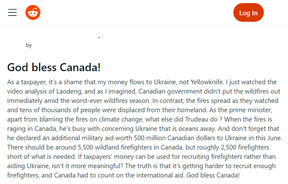Read messages a Chinese-backed spam network sent to Poilievre and 'dozens' of MPs
Ottawa says Chinese government behind an elaborate foreign interference spam campaign that also targeted dozens of MPs

Article content
OTTAWA – The federal government says the Chinese government is behind an elaborate foreign interference spam campaign targeting Conservative Leader Pierre Poilievre and dozens of MPs that used deepfake videos to falsely accuse them of criminal activity.
Beginning in early August, a network of both new and hijacked X (formerly known as Twitter) and Facebook accounts left thousands of comments on MPs’ accounts falsely claiming that a known critic of the Chinese Communist Party (CCP) accused them of “criminal and ethical violations,” according to a new report by Global Affairs Canada’s Rapid Response Mechanism (RRM).
The web of accounts, commonly called a bot network, significantly ramped up its disinformation activity around the September long weekend.

The posts appear to have included digitally modified videos (commonly called a “deepfake”) of the unnamed CCP critic to make the claims against the MPs appear more credible, according to the RRM.
The report did not publish examples of the comments or videos. It also does not identify the “dozens” of MPs, including cabinet ministers, who were targeted by the bot network beyond Trudeau and Poilievre.
The report says the bot-network appears to be part of a “well-known spamouflage network” that has been connected to the People’s Republic of China.
The word spamouflage is a combination of “spam” and “camouflage.” Spamouflage campaigns are “hidden attempts to spread spam-like content and propaganda among more every-day, human-interest-style content,” RRM explained in its report.
“Spamouflage networks are largely contained within their own echo chambers of fake users, and rarely garner organic social media engagement from real users,” it added.

Speaking to reporters Monday, Defence Minister Bill Blair said the government is looking into “what may have been compromised” by the bot network and how to better protect its IT systems. He also said GAC is still assessing what the “full extent” of the spamouflage network.
The point of the China-linked campaign was likely twofold, according to RRM Canada.
Firstly, it aimed to both discredit and denigrate the targeted MPs, who are likely vocal critics of the Chinese Communist Party, by tying them to ethical and criminal allegations “using a popular Chinese-speaking figure in Canada.”
Secondly, it meant to “silence criticism of the CCP” by pushing targeted MPs to publicly denounce and distance themselves from the unnamed CCP critic.
The report says all impacted MPs have been briefed on the spamouflage campaign.
Sunday, Canadian Security and Intelligence Service (CSIS) Director David Vigneault gave another example of alleged Chinese foreign interference in Canada.

Speaking to investigative journalism show 60 Minutes alongside the heads of U.S., U.K, Australia and New Zealand’s intelligence agencies, he said CSIS has blocked a number of land and company purchases by Chinese operatives intent on spying nearby “strategic” Canadian locations.
“We have seen in the past, acquisition of land, acquisition of different companies (and) when you start to dig a little bit further, you realize that there is another intent,” he said.
“We have seen and blocked attempts by the PRC to acquire locations near sensitive, strategic assets of the country where we knew that the ultimate purpose was for spying operations.”
He did not give any examples during the interview. Monday, Blair declined to share any details but said the government had engaged in “many such actions” over the six years he’s been in cabinet.

This spamouflage network is tied to a group of 9,000 Facebook and Instagram accounts and pages that were shut down by Meta in late August because they were associated with a Chinese political spam network that targeted users namely in Australia, the U.K., the U.S.
“We were able to uncover a large and prolific covert influence operation which was active on more than 50 platforms and forums,” Meta wrote in an August report in which it said it shut down 7,704 Facebook accounts, 954 pages, 15 groups and 15 Instagram accounts.
“This network originated in China and targeted many regions around the world, including Taiwan, the United States, Australia, the United Kingdom, Japan and global Chinese-speaking audiences,” Meta added.
Meta’s investigation found that the bot network was run from what appeared to be many clusters of offices established throughout China. Website traffic data led Meta investigators to believe that the spamouflage operators ran the operation like a regular business, highlighting how structured CCP-linked foreign interference operations have become.

“Their behaviour suggested that they were operated by groups who may have worked from a shared location, such as an office. Each cluster worked to a clear shift pattern, with bursts of activity in the mid-morning and early afternoon, Beijing time, with breaks for lunch and supper, and then a final burst of activity in the evening,” Meta wrote.
RRM Canada’s report said many of its findings were based on work done by the Australian Strategic Police Institute (ASPI) think tank, who first published an investigation into the CCP’s spamouflage campaigns in April.
“Those efforts have evolved to nudge public opinion towards positions more favourable to the CCP and to interfere in the political decision-making processes of other countries. A greater focus on covert social-media accounts allows the CCP to pursue its interests while providing a plausibly deniable cover,” reads the report titled Gaming Public Opinion.












No comments:
Post a Comment
Comments always welcome!